Report on Learning Theories, Curriculum Development, and Reflection
VerifiedAdded on 2022/12/28
|9
|1241
|2
Report
AI Summary
This report delves into the analysis of learning theories and preferences, focusing on their application in Functional Skills Maths. It examines various theories, including pedagogy, andragogy, behaviorism, cognitivism, constructivism, humanism, Kolb's experiential learning, Honey and Mumford's learning styles, Gardner's multiple intelligences, and Fleming's VARK model. The report explores how these theories can be applied to teaching, learning, and assessment, along with their respective strengths and weaknesses. It also investigates the importance of identifying and accommodating individual learning preferences for inclusive teaching. Furthermore, the report analyzes different curriculum development models such as product, process, praxis, spiral, linear, and thematic approaches. Finally, it assesses theories and models of reflection and evaluation, including Kirkpatrick, Stufflebeam, Moon, Gibbs, Schon, Kolb, and Brookfield, highlighting their strengths and weaknesses in enhancing learning outcomes. The report concludes by emphasizing the significance of these theories in personal and professional development.
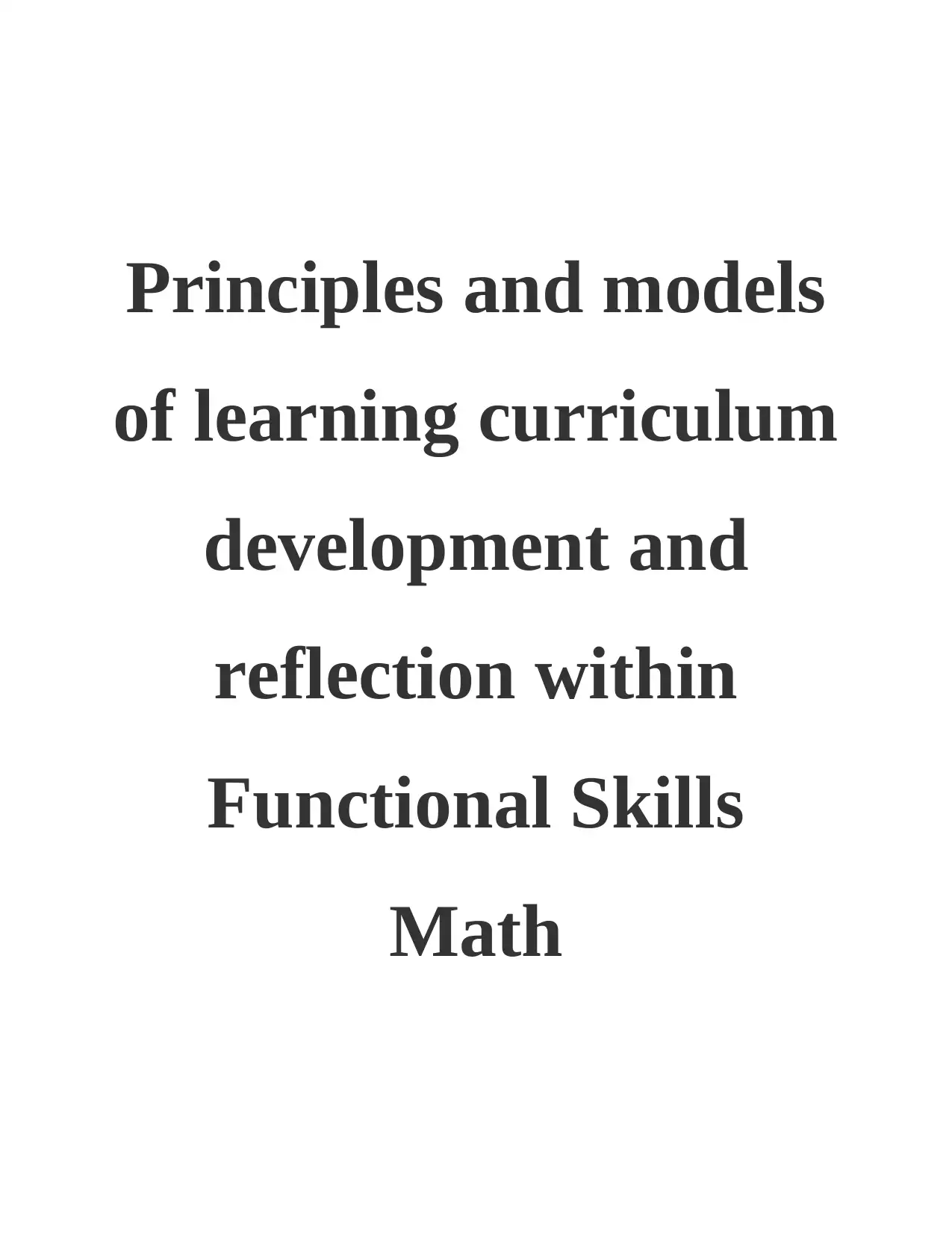
Principles and models
of learning curriculum
development and
reflection within
Functional Skills
Math
of learning curriculum
development and
reflection within
Functional Skills
Math
Paraphrase This Document
Need a fresh take? Get an instant paraphrase of this document with our AI Paraphraser
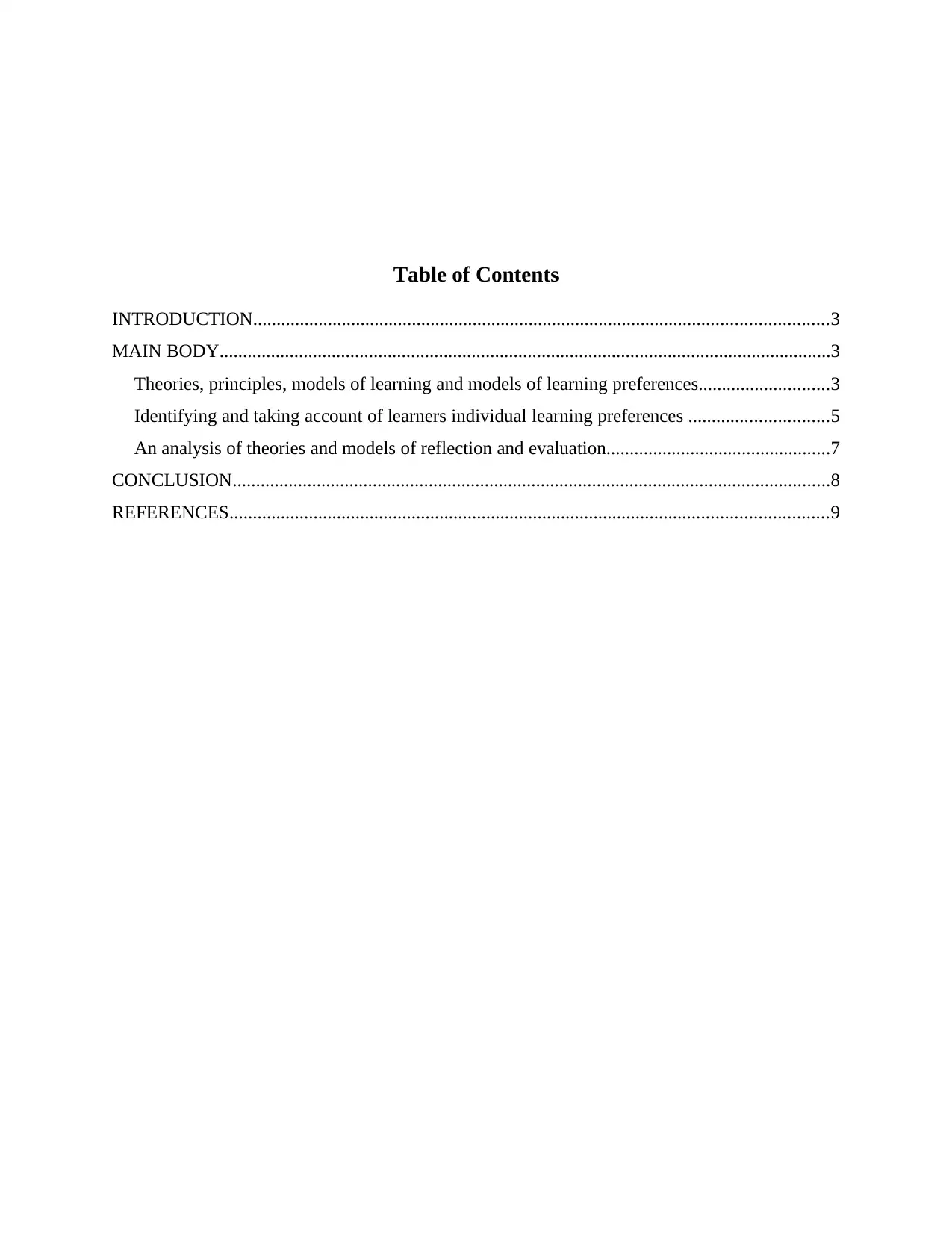
Table of Contents
INTRODUCTION...........................................................................................................................3
MAIN BODY...................................................................................................................................3
Theories, principles, models of learning and models of learning preferences............................3
Identifying and taking account of learners individual learning preferences ..............................5
An analysis of theories and models of reflection and evaluation................................................7
CONCLUSION................................................................................................................................8
REFERENCES................................................................................................................................9
INTRODUCTION...........................................................................................................................3
MAIN BODY...................................................................................................................................3
Theories, principles, models of learning and models of learning preferences............................3
Identifying and taking account of learners individual learning preferences ..............................5
An analysis of theories and models of reflection and evaluation................................................7
CONCLUSION................................................................................................................................8
REFERENCES................................................................................................................................9
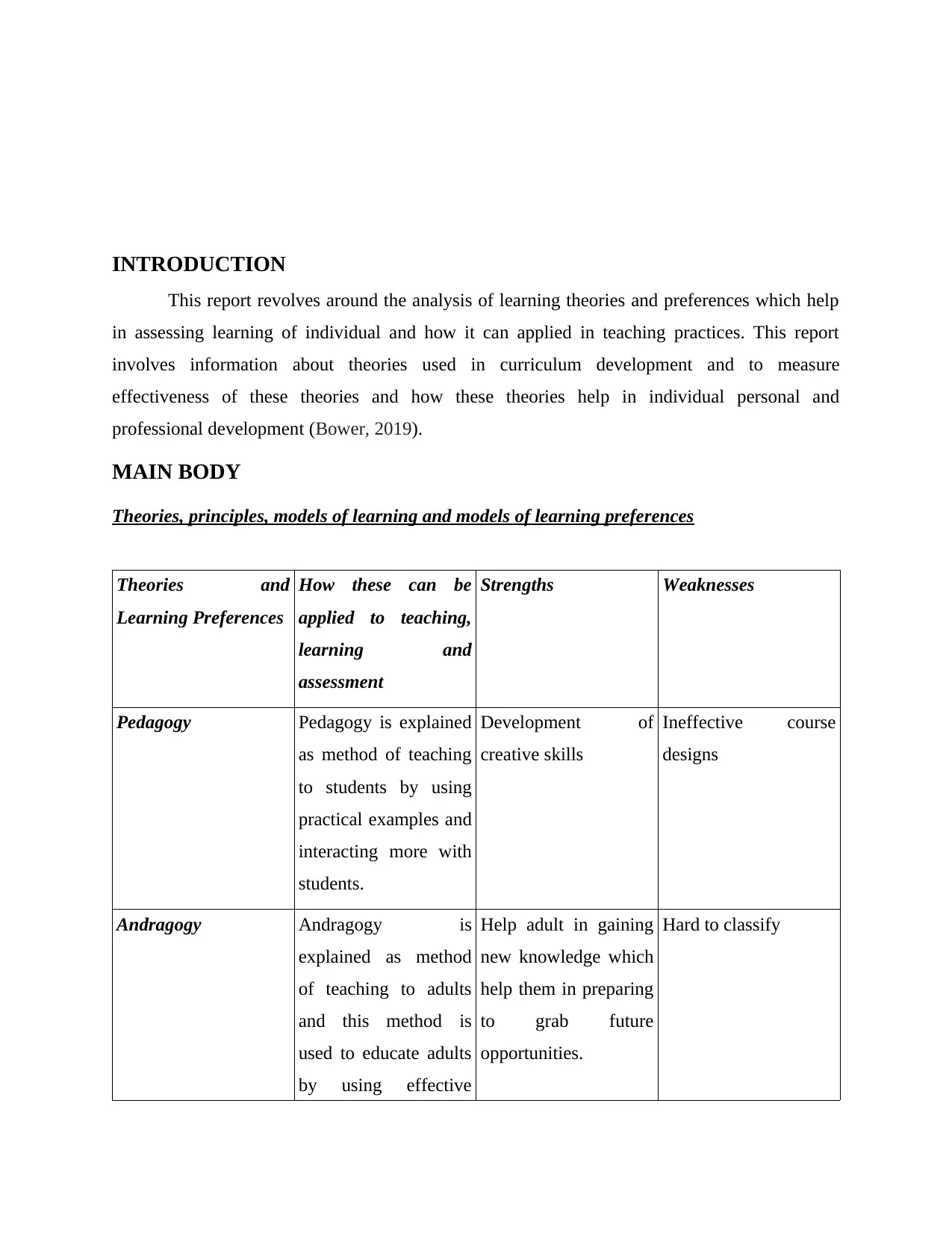
INTRODUCTION
This report revolves around the analysis of learning theories and preferences which help
in assessing learning of individual and how it can applied in teaching practices. This report
involves information about theories used in curriculum development and to measure
effectiveness of these theories and how these theories help in individual personal and
professional development (Bower, 2019).
MAIN BODY
Theories, principles, models of learning and models of learning preferences
Theories and
Learning Preferences
How these can be
applied to teaching,
learning and
assessment
Strengths Weaknesses
Pedagogy Pedagogy is explained
as method of teaching
to students by using
practical examples and
interacting more with
students.
Development of
creative skills
Ineffective course
designs
Andragogy Andragogy is
explained as method
of teaching to adults
and this method is
used to educate adults
by using effective
Help adult in gaining
new knowledge which
help them in preparing
to grab future
opportunities.
Hard to classify
This report revolves around the analysis of learning theories and preferences which help
in assessing learning of individual and how it can applied in teaching practices. This report
involves information about theories used in curriculum development and to measure
effectiveness of these theories and how these theories help in individual personal and
professional development (Bower, 2019).
MAIN BODY
Theories, principles, models of learning and models of learning preferences
Theories and
Learning Preferences
How these can be
applied to teaching,
learning and
assessment
Strengths Weaknesses
Pedagogy Pedagogy is explained
as method of teaching
to students by using
practical examples and
interacting more with
students.
Development of
creative skills
Ineffective course
designs
Andragogy Andragogy is
explained as method
of teaching to adults
and this method is
used to educate adults
by using effective
Help adult in gaining
new knowledge which
help them in preparing
to grab future
opportunities.
Hard to classify
⊘ This is a preview!⊘
Do you want full access?
Subscribe today to unlock all pages.

Trusted by 1+ million students worldwide
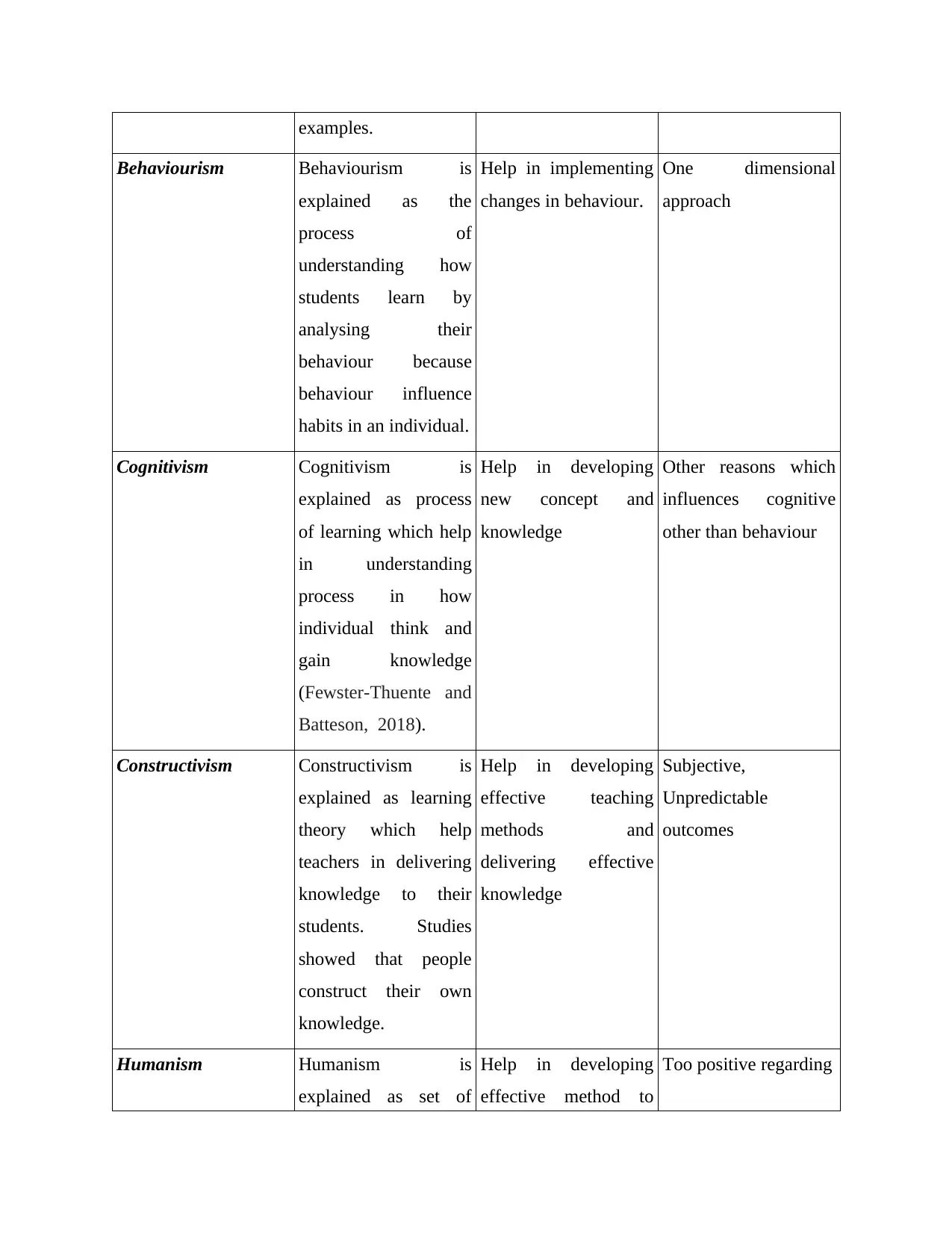
examples.
Behaviourism Behaviourism is
explained as the
process of
understanding how
students learn by
analysing their
behaviour because
behaviour influence
habits in an individual.
Help in implementing
changes in behaviour.
One dimensional
approach
Cognitivism Cognitivism is
explained as process
of learning which help
in understanding
process in how
individual think and
gain knowledge
(Fewster-Thuente and
Batteson, 2018).
Help in developing
new concept and
knowledge
Other reasons which
influences cognitive
other than behaviour
Constructivism Constructivism is
explained as learning
theory which help
teachers in delivering
knowledge to their
students. Studies
showed that people
construct their own
knowledge.
Help in developing
effective teaching
methods and
delivering effective
knowledge
Subjective,
Unpredictable
outcomes
Humanism Humanism is
explained as set of
Help in developing
effective method to
Too positive regarding
Behaviourism Behaviourism is
explained as the
process of
understanding how
students learn by
analysing their
behaviour because
behaviour influence
habits in an individual.
Help in implementing
changes in behaviour.
One dimensional
approach
Cognitivism Cognitivism is
explained as process
of learning which help
in understanding
process in how
individual think and
gain knowledge
(Fewster-Thuente and
Batteson, 2018).
Help in developing
new concept and
knowledge
Other reasons which
influences cognitive
other than behaviour
Constructivism Constructivism is
explained as learning
theory which help
teachers in delivering
knowledge to their
students. Studies
showed that people
construct their own
knowledge.
Help in developing
effective teaching
methods and
delivering effective
knowledge
Subjective,
Unpredictable
outcomes
Humanism Humanism is
explained as set of
Help in developing
effective method to
Too positive regarding
Paraphrase This Document
Need a fresh take? Get an instant paraphrase of this document with our AI Paraphraser
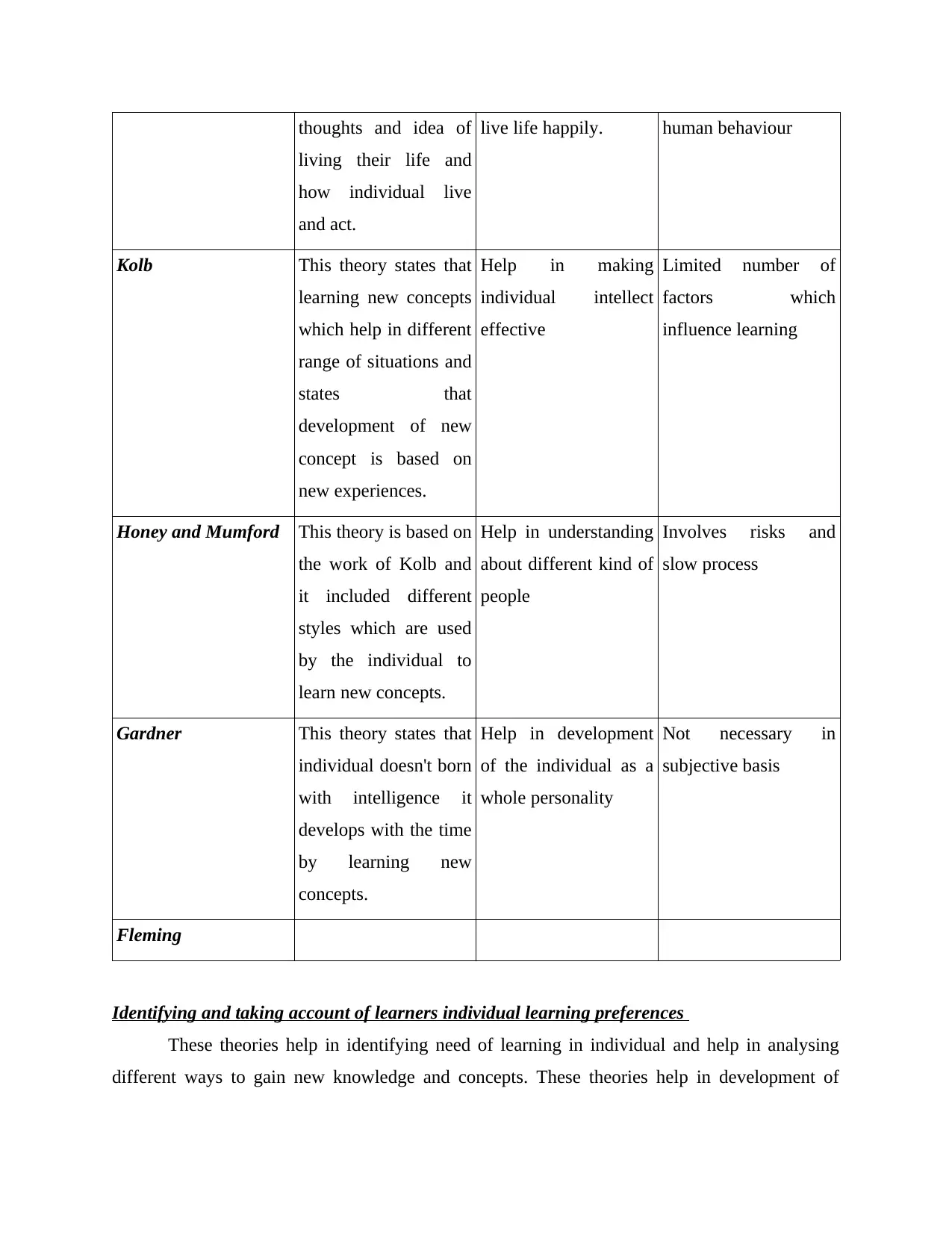
thoughts and idea of
living their life and
how individual live
and act.
live life happily. human behaviour
Kolb This theory states that
learning new concepts
which help in different
range of situations and
states that
development of new
concept is based on
new experiences.
Help in making
individual intellect
effective
Limited number of
factors which
influence learning
Honey and Mumford This theory is based on
the work of Kolb and
it included different
styles which are used
by the individual to
learn new concepts.
Help in understanding
about different kind of
people
Involves risks and
slow process
Gardner This theory states that
individual doesn't born
with intelligence it
develops with the time
by learning new
concepts.
Help in development
of the individual as a
whole personality
Not necessary in
subjective basis
Fleming
Identifying and taking account of learners individual learning preferences
These theories help in identifying need of learning in individual and help in analysing
different ways to gain new knowledge and concepts. These theories help in development of
living their life and
how individual live
and act.
live life happily. human behaviour
Kolb This theory states that
learning new concepts
which help in different
range of situations and
states that
development of new
concept is based on
new experiences.
Help in making
individual intellect
effective
Limited number of
factors which
influence learning
Honey and Mumford This theory is based on
the work of Kolb and
it included different
styles which are used
by the individual to
learn new concepts.
Help in understanding
about different kind of
people
Involves risks and
slow process
Gardner This theory states that
individual doesn't born
with intelligence it
develops with the time
by learning new
concepts.
Help in development
of the individual as a
whole personality
Not necessary in
subjective basis
Fleming
Identifying and taking account of learners individual learning preferences
These theories help in identifying need of learning in individual and help in analysing
different ways to gain new knowledge and concepts. These theories help in development of
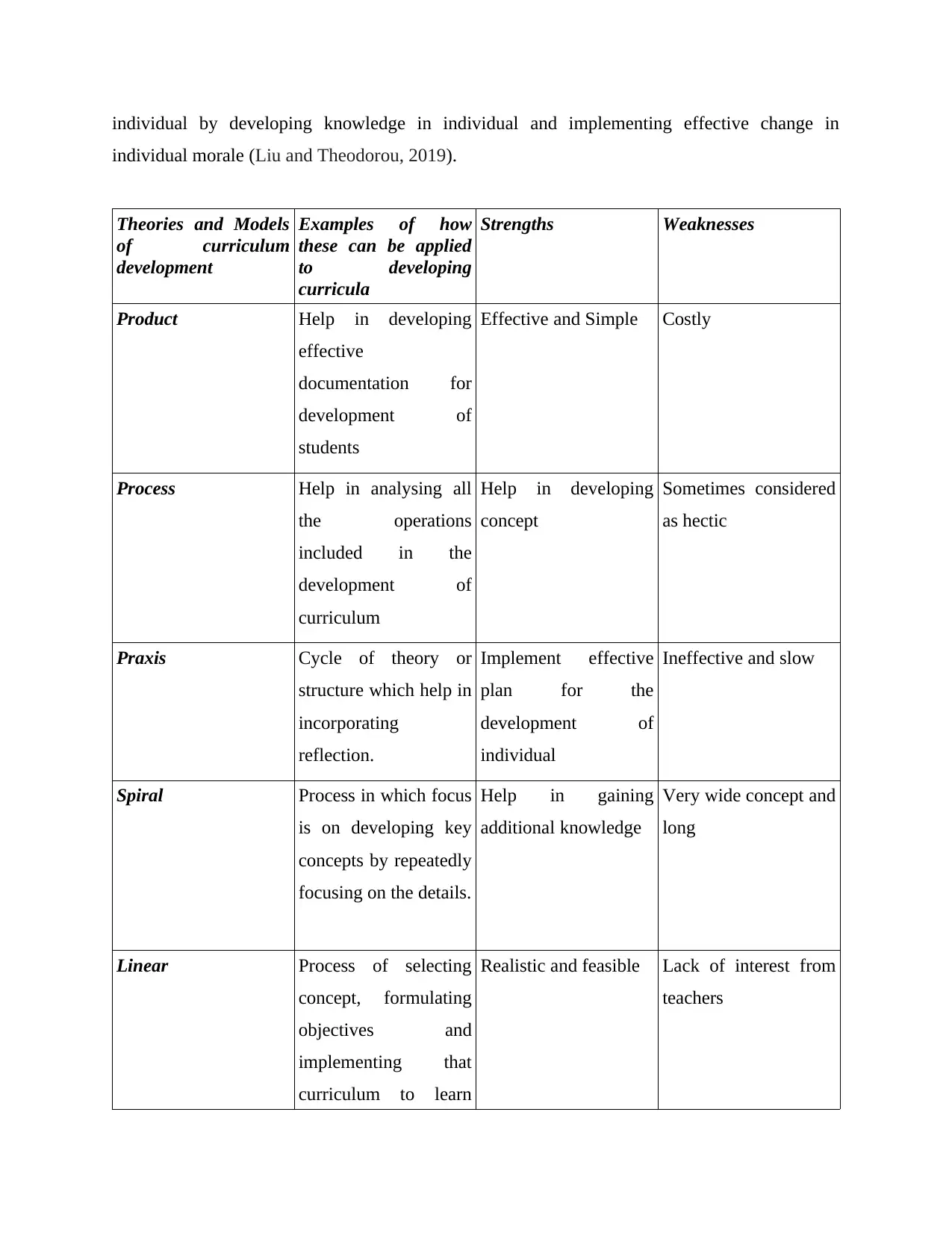
individual by developing knowledge in individual and implementing effective change in
individual morale (Liu and Theodorou, 2019).
Theories and Models
of curriculum
development
Examples of how
these can be applied
to developing
curricula
Strengths Weaknesses
Product Help in developing
effective
documentation for
development of
students
Effective and Simple Costly
Process Help in analysing all
the operations
included in the
development of
curriculum
Help in developing
concept
Sometimes considered
as hectic
Praxis Cycle of theory or
structure which help in
incorporating
reflection.
Implement effective
plan for the
development of
individual
Ineffective and slow
Spiral Process in which focus
is on developing key
concepts by repeatedly
focusing on the details.
Help in gaining
additional knowledge
Very wide concept and
long
Linear Process of selecting
concept, formulating
objectives and
implementing that
curriculum to learn
Realistic and feasible Lack of interest from
teachers
individual morale (Liu and Theodorou, 2019).
Theories and Models
of curriculum
development
Examples of how
these can be applied
to developing
curricula
Strengths Weaknesses
Product Help in developing
effective
documentation for
development of
students
Effective and Simple Costly
Process Help in analysing all
the operations
included in the
development of
curriculum
Help in developing
concept
Sometimes considered
as hectic
Praxis Cycle of theory or
structure which help in
incorporating
reflection.
Implement effective
plan for the
development of
individual
Ineffective and slow
Spiral Process in which focus
is on developing key
concepts by repeatedly
focusing on the details.
Help in gaining
additional knowledge
Very wide concept and
long
Linear Process of selecting
concept, formulating
objectives and
implementing that
curriculum to learn
Realistic and feasible Lack of interest from
teachers
⊘ This is a preview!⊘
Do you want full access?
Subscribe today to unlock all pages.

Trusted by 1+ million students worldwide
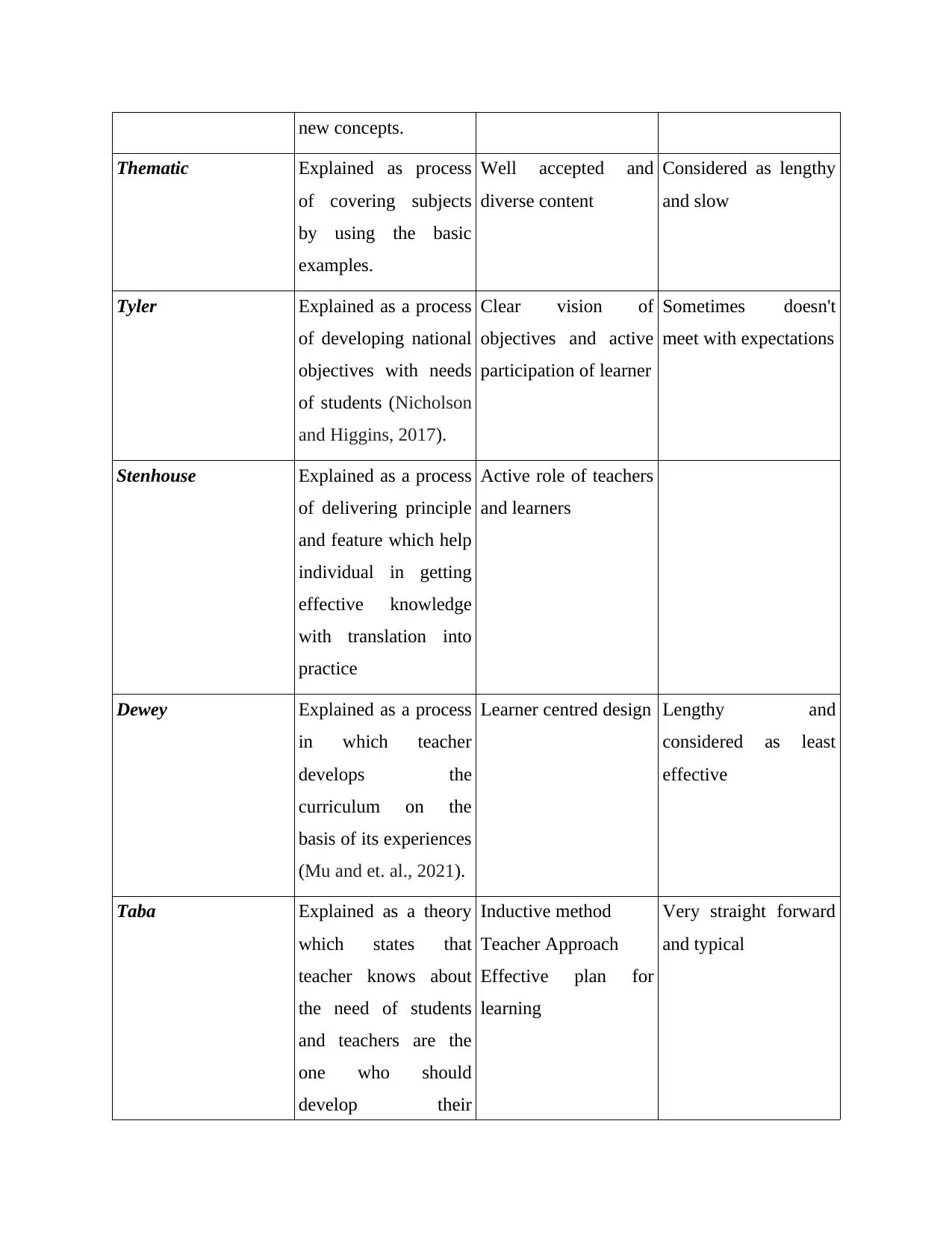
new concepts.
Thematic Explained as process
of covering subjects
by using the basic
examples.
Well accepted and
diverse content
Considered as lengthy
and slow
Tyler Explained as a process
of developing national
objectives with needs
of students (Nicholson
and Higgins, 2017).
Clear vision of
objectives and active
participation of learner
Sometimes doesn't
meet with expectations
Stenhouse Explained as a process
of delivering principle
and feature which help
individual in getting
effective knowledge
with translation into
practice
Active role of teachers
and learners
Dewey Explained as a process
in which teacher
develops the
curriculum on the
basis of its experiences
(Mu and et. al., 2021).
Learner centred design Lengthy and
considered as least
effective
Taba Explained as a theory
which states that
teacher knows about
the need of students
and teachers are the
one who should
develop their
Inductive method
Teacher Approach
Effective plan for
learning
Very straight forward
and typical
Thematic Explained as process
of covering subjects
by using the basic
examples.
Well accepted and
diverse content
Considered as lengthy
and slow
Tyler Explained as a process
of developing national
objectives with needs
of students (Nicholson
and Higgins, 2017).
Clear vision of
objectives and active
participation of learner
Sometimes doesn't
meet with expectations
Stenhouse Explained as a process
of delivering principle
and feature which help
individual in getting
effective knowledge
with translation into
practice
Active role of teachers
and learners
Dewey Explained as a process
in which teacher
develops the
curriculum on the
basis of its experiences
(Mu and et. al., 2021).
Learner centred design Lengthy and
considered as least
effective
Taba Explained as a theory
which states that
teacher knows about
the need of students
and teachers are the
one who should
develop their
Inductive method
Teacher Approach
Effective plan for
learning
Very straight forward
and typical
Paraphrase This Document
Need a fresh take? Get an instant paraphrase of this document with our AI Paraphraser
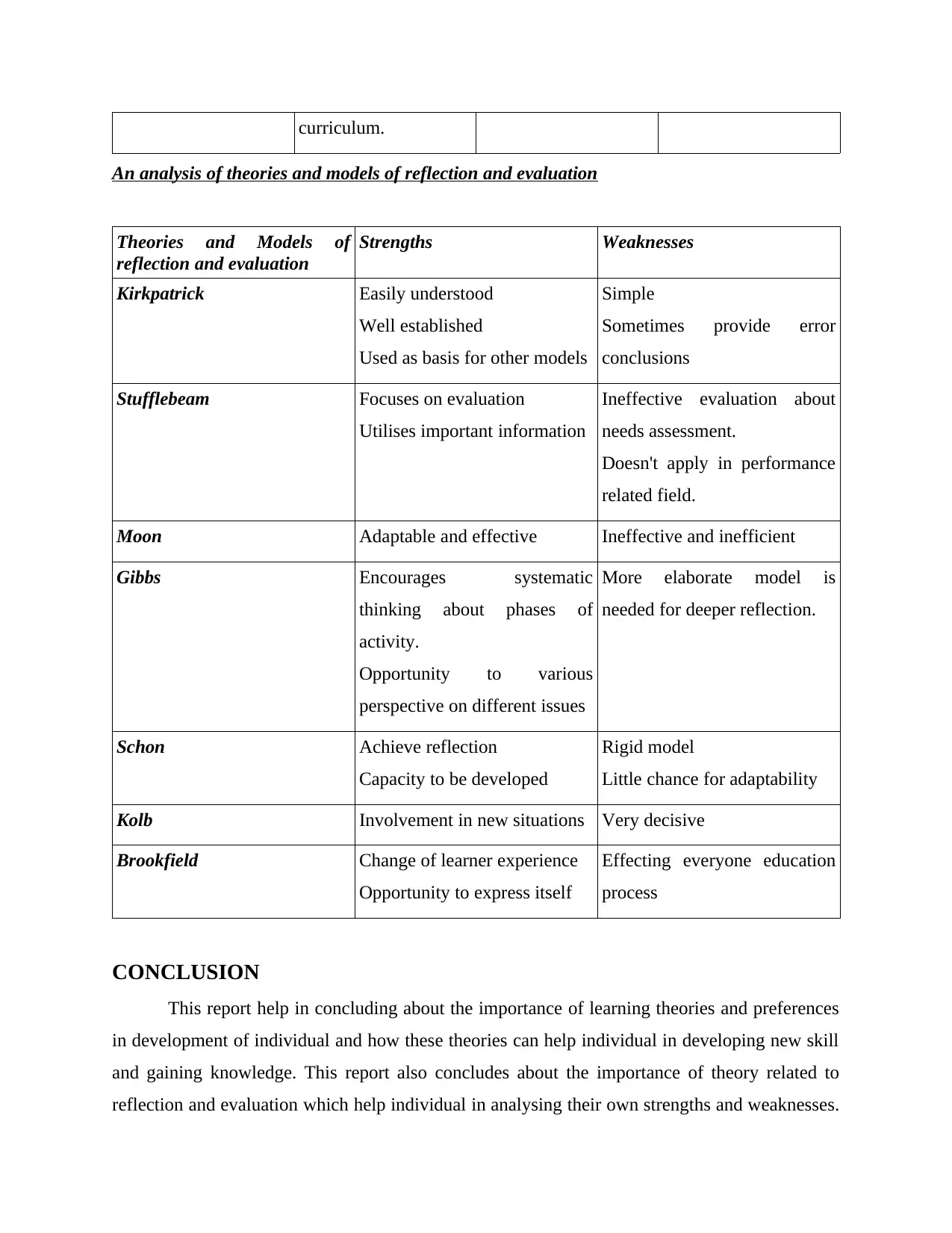
curriculum.
An analysis of theories and models of reflection and evaluation
Theories and Models of
reflection and evaluation
Strengths Weaknesses
Kirkpatrick Easily understood
Well established
Used as basis for other models
Simple
Sometimes provide error
conclusions
Stufflebeam Focuses on evaluation
Utilises important information
Ineffective evaluation about
needs assessment.
Doesn't apply in performance
related field.
Moon Adaptable and effective Ineffective and inefficient
Gibbs Encourages systematic
thinking about phases of
activity.
Opportunity to various
perspective on different issues
More elaborate model is
needed for deeper reflection.
Schon Achieve reflection
Capacity to be developed
Rigid model
Little chance for adaptability
Kolb Involvement in new situations Very decisive
Brookfield Change of learner experience
Opportunity to express itself
Effecting everyone education
process
CONCLUSION
This report help in concluding about the importance of learning theories and preferences
in development of individual and how these theories can help individual in developing new skill
and gaining knowledge. This report also concludes about the importance of theory related to
reflection and evaluation which help individual in analysing their own strengths and weaknesses.
An analysis of theories and models of reflection and evaluation
Theories and Models of
reflection and evaluation
Strengths Weaknesses
Kirkpatrick Easily understood
Well established
Used as basis for other models
Simple
Sometimes provide error
conclusions
Stufflebeam Focuses on evaluation
Utilises important information
Ineffective evaluation about
needs assessment.
Doesn't apply in performance
related field.
Moon Adaptable and effective Ineffective and inefficient
Gibbs Encourages systematic
thinking about phases of
activity.
Opportunity to various
perspective on different issues
More elaborate model is
needed for deeper reflection.
Schon Achieve reflection
Capacity to be developed
Rigid model
Little chance for adaptability
Kolb Involvement in new situations Very decisive
Brookfield Change of learner experience
Opportunity to express itself
Effecting everyone education
process
CONCLUSION
This report help in concluding about the importance of learning theories and preferences
in development of individual and how these theories can help individual in developing new skill
and gaining knowledge. This report also concludes about the importance of theory related to
reflection and evaluation which help individual in analysing their own strengths and weaknesses.
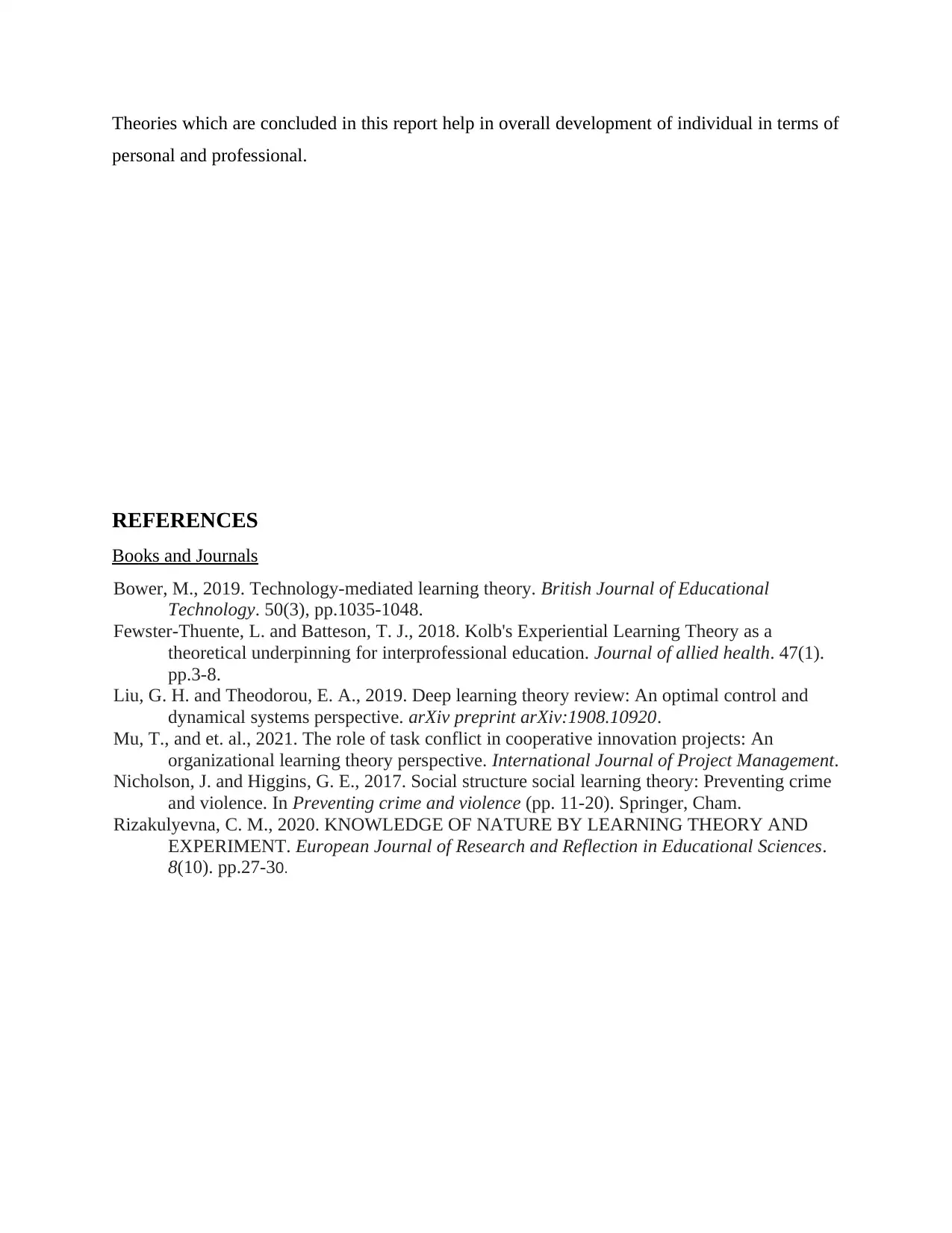
Theories which are concluded in this report help in overall development of individual in terms of
personal and professional.
REFERENCES
Books and Journals
Bower, M., 2019. Technology‐mediated learning theory. British Journal of Educational
Technology. 50(3), pp.1035-1048.
Fewster-Thuente, L. and Batteson, T. J., 2018. Kolb's Experiential Learning Theory as a
theoretical underpinning for interprofessional education. Journal of allied health. 47(1).
pp.3-8.
Liu, G. H. and Theodorou, E. A., 2019. Deep learning theory review: An optimal control and
dynamical systems perspective. arXiv preprint arXiv:1908.10920.
Mu, T., and et. al., 2021. The role of task conflict in cooperative innovation projects: An
organizational learning theory perspective. International Journal of Project Management.
Nicholson, J. and Higgins, G. E., 2017. Social structure social learning theory: Preventing crime
and violence. In Preventing crime and violence (pp. 11-20). Springer, Cham.
Rizakulyevna, C. M., 2020. KNOWLEDGE OF NATURE BY LEARNING THEORY AND
EXPERIMENT. European Journal of Research and Reflection in Educational Sciences.
8(10). pp.27-30.
personal and professional.
REFERENCES
Books and Journals
Bower, M., 2019. Technology‐mediated learning theory. British Journal of Educational
Technology. 50(3), pp.1035-1048.
Fewster-Thuente, L. and Batteson, T. J., 2018. Kolb's Experiential Learning Theory as a
theoretical underpinning for interprofessional education. Journal of allied health. 47(1).
pp.3-8.
Liu, G. H. and Theodorou, E. A., 2019. Deep learning theory review: An optimal control and
dynamical systems perspective. arXiv preprint arXiv:1908.10920.
Mu, T., and et. al., 2021. The role of task conflict in cooperative innovation projects: An
organizational learning theory perspective. International Journal of Project Management.
Nicholson, J. and Higgins, G. E., 2017. Social structure social learning theory: Preventing crime
and violence. In Preventing crime and violence (pp. 11-20). Springer, Cham.
Rizakulyevna, C. M., 2020. KNOWLEDGE OF NATURE BY LEARNING THEORY AND
EXPERIMENT. European Journal of Research and Reflection in Educational Sciences.
8(10). pp.27-30.
⊘ This is a preview!⊘
Do you want full access?
Subscribe today to unlock all pages.

Trusted by 1+ million students worldwide
1 out of 9
Related Documents
Your All-in-One AI-Powered Toolkit for Academic Success.
+13062052269
info@desklib.com
Available 24*7 on WhatsApp / Email
![[object Object]](/_next/static/media/star-bottom.7253800d.svg)
Unlock your academic potential
Copyright © 2020–2026 A2Z Services. All Rights Reserved. Developed and managed by ZUCOL.


